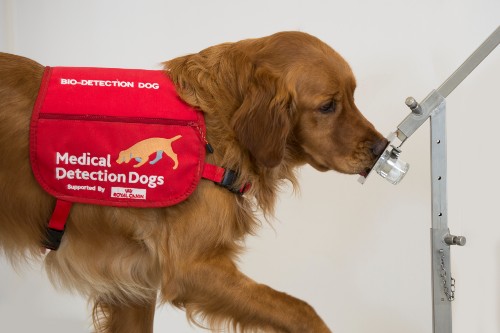Dogs really can be trained to smell Parkinson's disease, according to new research from the United Kingdom.
In a double blind trial, a Golden Retriever and a Labrador were able to sniff out which skin swabs came from people with Parkinson's.
The smell of the oily secretions seemed to hold secret clues.
"The dogs in this study achieved high sensitivity and specificity and showed there is an olfactory signature distinct to patients with the disease," says animal behavioral scientist Nicola Rooney from the University of Bristol.
"Sensitivity levels of 70 percent and 80 percent are well above chance, and I believe that dogs could help us to develop a quick, non-invasive, and cost-effective method to identify patients with Parkinson's disease."
Related: Dogs Might Actually 'See' Through Smells, Brain Scans Suggest
Today, there is no definitive early test for Parkinson's, which is why scientists are so interested in finding potential biomarkers of the disease on our skin.

The knowledge that Parkinson's distinctly changes a person's body odor first came to light roughly a decade ago – all because of one woman.
Twelve years before her husband's diagnosis of Parkinson's disease, Joy Milne could sense something was off – specifically, she could smell it.
Milne, a Scottish nurse, is known as a 'super-smeller', and in 2016, she became famous among neuroscientists for her extraordinary abilities.
In a small pilot study, Milne correctly identified each patient with Parkinson's disease based solely on the scent of their shirts. Her one misidentification turned out to be correct nearly a year later.
The news raised an important question: If someone like Milne could smell Parkinson's years before it was diagnosed, could a dog do the same?
Dogs are known to have incredible senses of smell, far more powerful than our own. Previous studies have found our pets can smell our stress, our coronavirus infections, and even our cancers – so if a distinct odor for Parkinson's does exist, then maybe a dog can sniff it out, too.
In the past decade, a few preliminary trials have provided evidence for that hypothesis. But some only gave limited information on how the dogs were trained and tested.

The recent trial from the UK is a collaboration between a program called Medical Detection Dogs and neuroscientists at the University of Manchester.
One goal of the research is to figure out what the dogs are actually smelling, and why.
In 2019, for instance, researchers at Manchester helped identify which odor compounds set the distinctive smell of Parkinson's apart. Their results were later confirmed by Milne, the serendipitous "super-smeller".
A few years on, the odor compounds were used to create a diagnostic 'swab test' for Parkinson's, currently in testing.
Perhaps, further down the road, trained dogs could help neuroscientists identify more unique biomarkers of the disease.
The trouble is, though, not all canines are up to snuff. In the current trial, only 2 out of 10 dogs made it through training, and neither performed perfectly.
One dog, for instance, falsely flagged a tenth of the odor swabs from healthy people as having Parkinson's. The other gave false alarms less than 2 percent of the time.
Overall, however, the dogs could smell which person had Parkinson's at a rate well above chance, providing proof of principle.
"We are extremely proud to say that once again, dogs can very accurately detect disease," says Claire Guest, the CEO of Medical Detection Dogs.
"There is currently no early test for Parkinson's disease and symptoms may start up to 20 years before they become visible and persistent leading to a confirmed diagnosis.
"Timely diagnosis is key… "
The study was published in the Journal of Parkinson's Disease.
